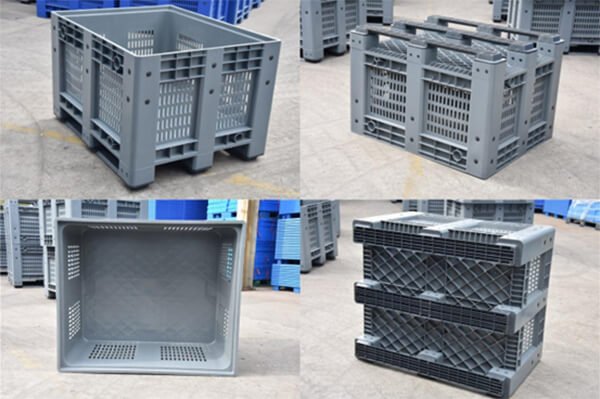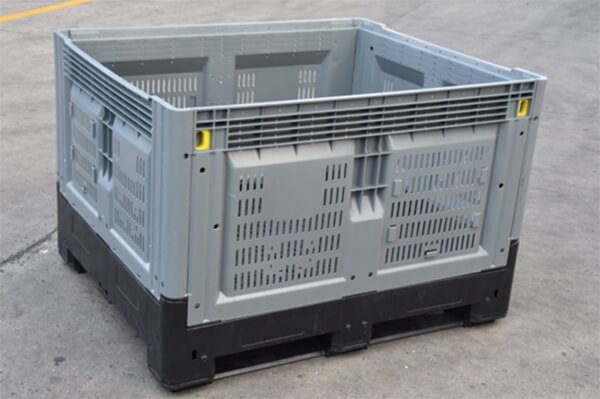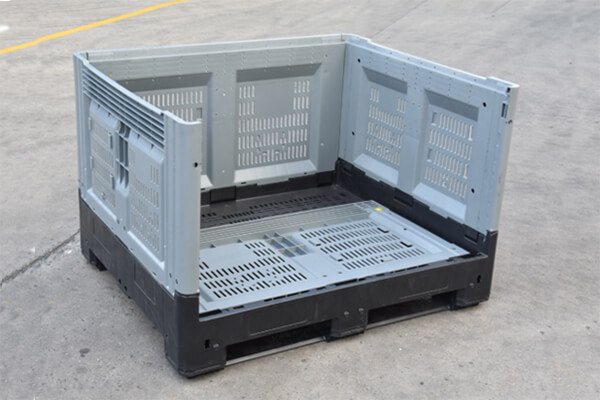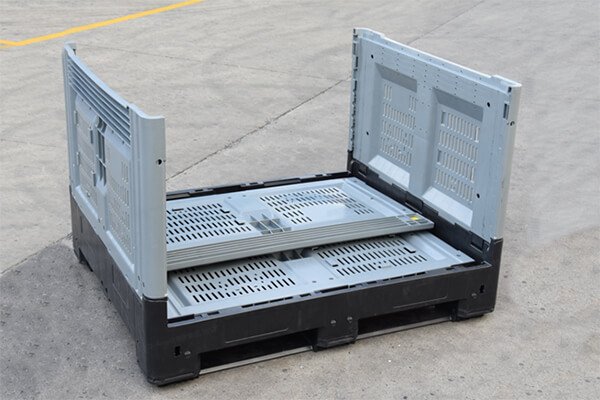When it comes to transporting and storing goods in bulk, pallet boxes are essential across industries—from manufacturing and agriculture to logistics and retail. Among the most commonly used materials for pallet boxes are plastic, wood, and metal, each offering its unique benefits and drawbacks.
With the growing demand for space-saving, cost-efficient, and durable packaging solutions, foldable plastic pallet boxes have emerged as a strong contender to traditional wooden and metal alternatives. But are they the right fit for your operations?

In this blog post, we’ll take a deep dive into how foldable plastic pallet boxes compare to their wooden and metal counterparts, helping you make an informed decision for your business.
1. Durability and Longevity
- Plastic (Foldable):
Foldable plastic pallet boxes are made from robust materials like high-density polyethylene (HDPE) or polypropylene (PP), which are highly resistant to moisture, chemicals, and impact. These containers typically offer excellent long-term durability, often lasting through hundreds of uses without significant wear. - Wood:
Wooden pallet boxes are strong and rugged, especially suitable for heavy goods. However, they are prone to splintering, warping, and rotting when exposed to moisture or extreme temperatures. Their durability is often reduced by environmental factors and rough handling. - Metal:
Metal pallet boxes—often made from steel or aluminum—are extremely durable and ideal for heavy-duty applications. They resist deformation and can last for many years. However, they are susceptible to rust if not properly treated or coated.
✅ Winner: Tie between Plastic and Metal (depending on the environment and load requirements)
2. Weight and Handling
- Plastic (Foldable):
Lightweight by design, foldable plastic boxes are easy to handle, reducing strain on workers and lowering transportation costs. Their collapsible nature also makes them easy to store and return when empty, optimizing logistics. - Wood:
Wood is heavier than plastic and lacks collapsibility, which can lead to higher shipping costs and more complex storage logistics. They also require more care during manual handling due to the risk of splinters or nails. - Metal:
Metal boxes are the heaviest of the three, which makes them more durable but significantly less efficient in terms of manual handling and freight costs.
✅ Winner: Plastic

3. Hygiene and Cleanability
- Plastic (Foldable):
Plastic boxes are non-porous and easy to clean, making them ideal for industries with strict hygiene standards like food processing, pharmaceuticals, and electronics. They are resistant to mold, mildew, and bacteria buildup. - Wood:
Wood is highly absorbent, making it a breeding ground for mold and bacteria if not treated. It’s not suitable for sterile or highly regulated environments and can be harder to sanitize properly. - Metal:
Metal boxes are generally hygienic but require more effort to clean, especially if they have intricate welds or rust spots. Their surface can harbor residues unless cleaned thoroughly.
✅ Winner: Plastic
4. Cost and Return on Investment (ROI)
- Plastic (Foldable):
Upfront costs for plastic boxes can be higher, but they offer significant ROI through reusability, lower transport costs, and longer lifespans. The ability to collapse also reduces return shipping expenses. - Wood:
Wooden pallet boxes are cheap initially, making them appealing for short-term or one-way logistics. However, they wear out faster and are often not reusable for long. - Metal:
Metal has the highest initial cost, but for businesses needing extremely durable long-term solutions (like automotive or industrial sectors), the investment can pay off. Still, they lack flexibility and can be overkill for lighter applications.
✅ Winner: Plastic for most mid- to long-term use cases
5. Environmental Impact
- Plastic (Foldable):
Although plastic is a petroleum-based product, many foldable pallet boxes are recyclable and reusable for years. Some manufacturers even use recycled materials in production, reducing the environmental footprint. - Wood:
Wood is a renewable resource, but wooden boxes are not always reusable and often end up as waste after one or two uses. Moreover, logging and treatment processes can have negative environmental impacts. - Metal:
Metal boxes are highly recyclable and long-lasting, but the energy-intensive process of mining and manufacturing can offset those benefits unless they are used for many years.
✅ Winner: Tie between Plastic and Metal (based on usage frequency and recycling practices)

6. Customization and Features
- Plastic (Foldable):
These boxes are highly customizable. You can choose features like drop-down doors, ventilation, RFID tags, and wheels. Their modular design is compatible with automation and smart warehouse systems. - Wood:
Wood offers limited customization. While dimensions can be adjusted, it’s harder to add features like access doors or tracking elements without compromising strength. - Metal:
Metal is customizable in terms of structure and locking mechanisms, but adjustments often require welding or specialized tooling, making it more costly and time-consuming.
✅ Winner: Plastic
7. Safety
- Plastic (Foldable):
Smooth edges and lightweight construction make plastic pallet boxes safer for workers. There’s no risk of splinters, nails, or sharp corners. - Wood:
Wood can cause splinters, protruding nails, and sharp edges, which are common causes of workplace injuries. - Metal:
Metal is very strong, but it can have sharp corners or dented edges over time. If not properly maintained, it can become a safety risk.

✅ Winner: Plastic
Final Verdict: Which One Should You Choose?
Each material has its strengths, and the right choice ultimately depends on your industry, budget, and operational needs. Here’s a quick summary:
| Feature | Plastic (Foldable) | Wood | Metal |
|---|---|---|---|
| Durability | ⭐⭐⭐⭐ | ⭐⭐ | ⭐⭐⭐⭐ |
| Weight | ⭐⭐⭐⭐ | ⭐⭐ | ⭐ |
| Hygiene | ⭐⭐⭐⭐ | ⭐ | ⭐⭐ |
| Cost Efficiency | ⭐⭐⭐⭐ | ⭐⭐ | ⭐⭐ |
| Sustainability | ⭐⭐⭐ | ⭐⭐ | ⭐⭐⭐ |
| Customization | ⭐⭐⭐⭐ | ⭐⭐ | ⭐⭐ |
| Safety | ⭐⭐⭐⭐ | ⭐ | ⭐⭐ |
🏆 Best Overall for Versatility and ROI: Foldable Plastic Pallet Boxes
Plastic foldable pallet boxes strike an ideal balance between durability, efficiency, safety, and sustainability, making them a smart investment for most businesses—especially those looking to scale logistics operations, reduce costs, and optimize storage.
Write At Last
Interested in upgrading your pallet box system? Reach out to Enlightening to explore models and features that best suit your business. A smart switch today can lead to long-term savings and better operations tomorrow.

